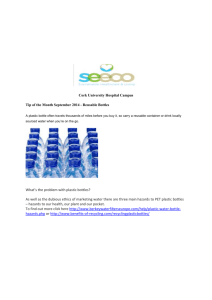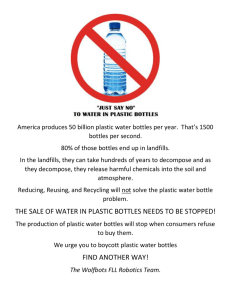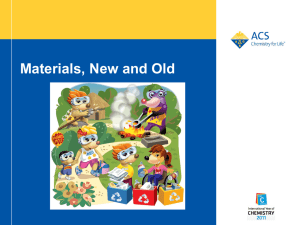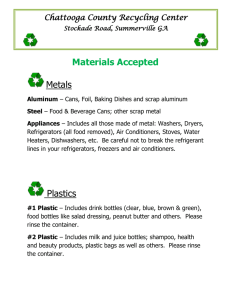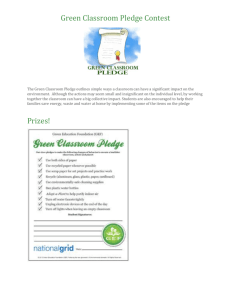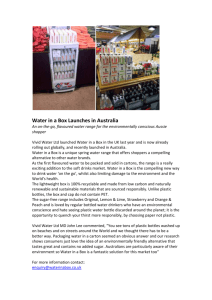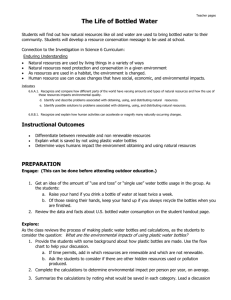File - FABB Bottle Babes
advertisement
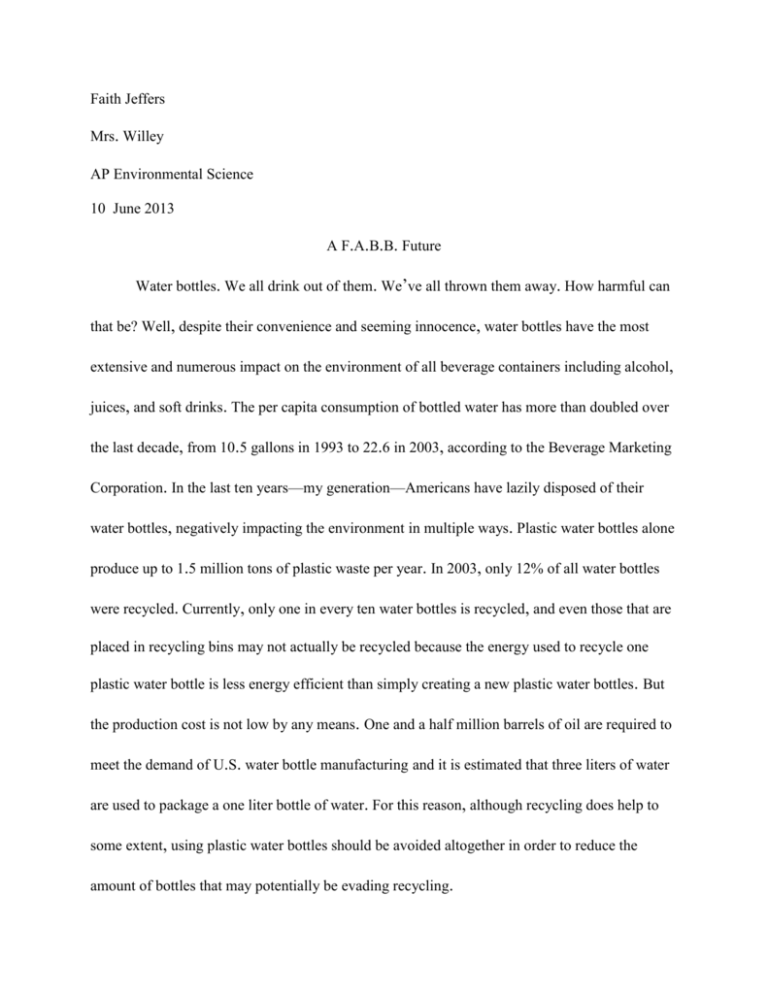
Faith Jeffers Mrs. Willey AP Environmental Science 10 June 2013 A F.A.B.B. Future Water bottles. We all drink out of them. We’ve all thrown them away. How harmful can that be? Well, despite their convenience and seeming innocence, water bottles have the most extensive and numerous impact on the environment of all beverage containers including alcohol, juices, and soft drinks. The per capita consumption of bottled water has more than doubled over the last decade, from 10.5 gallons in 1993 to 22.6 in 2003, according to the Beverage Marketing Corporation. In the last ten years—my generation—Americans have lazily disposed of their water bottles, negatively impacting the environment in multiple ways. Plastic water bottles alone produce up to 1.5 million tons of plastic waste per year. In 2003, only 12% of all water bottles were recycled. Currently, only one in every ten water bottles is recycled, and even those that are placed in recycling bins may not actually be recycled because the energy used to recycle one plastic water bottle is less energy efficient than simply creating a new plastic water bottles. But the production cost is not low by any means. One and a half million barrels of oil are required to meet the demand of U.S. water bottle manufacturing and it is estimated that three liters of water are used to package a one liter bottle of water. For this reason, although recycling does help to some extent, using plastic water bottles should be avoided altogether in order to reduce the amount of bottles that may potentially be evading recycling. When plastic water bottles break down in the ocean, they release toxins that endanger marine life by exposing them to chemicals that are foreign to their environment. In addition, plastic bottles in landfills leach harmful chemicals into groundwater which is then ingested by both animals and humans. Plastic debris that floats in the ocean is swallowed by hundreds of species choking and starving them. Pieces of plastic from bottles accumulate in the ocean, forming large masses of plastic debris, some even twice the size of Texas. Because of this floating debris, over 180 species of marine life have been reported to be killed by the ingestion of plastic. Not only are the energy and economic costs of using plastic water bottles detrimental to society, but wildlife also suffers from humans’ apathy in regards to plastic bottles. The improper disposal of plastic water bottles is clearly a growing and far-reaching problem throughout the world and particularly within the United States. In an effort to battle this monstrosity, the F.A.B.B. (Faith, Ariyana, Brooke, and Brooke) Bottle Babes took it upon ourselves to aid in encouraging the residents of Winston-Salem to recycle their plastic water bottles and raise awareness in order to hopefully limit the amount of plastic water bottles used in general. We refuse to be a part of this environmental hazard and we pledge to take it upon ourselves to create a positive example to our neighbors. To accomplish this goal of reducing the use of plastic water bottles and encouraging recycling, we displayed flyers in our neighborhoods advertising that we would collect any used plastic water bottles to be recycled. We hung the flyers on May 24 and then collected the bottles that neighborhood members left on their porches on June 1. After collecting the bottles, we made a video that followed the one out of ten water bottles that was recycled while the others were discarded into a landfill (of course we didn’t actually throw them away!) Then we used some of the bottles to make bird feeders and other small knick knacks and provided tutorial videos on our website in order to propose ideas for not only recycling but also reusing water bottles. Although we do not expect people to make bird feeders and piggy banks out of every plastic water bottle that they use, the ideas were created mainly to raise awareness for the problem of unrecycled water bottles that seemingly many people are oblivious to. Although we did not collect as many water bottles as we had hoped, we did collect enough to recognize that our effort to raise awareness had some impact on our community. Hopefully people will visit our website to watch our simplistic yet informative video that shows the corruptness of the way water bottles are used and disposed of. Throughout this process I came to be more aware of the negative impacts that my personal actions and those of others around me are having on the environment. I was in the dark in regards to the disposal of plastic water bottles and the harm they cause prior to researching this project. Although our project was a short-term event that will not be continued, I will continue to reduce my own and my family’s consumption of bottled water and when occasion rises that plastic bottles are used, I will be certain to dispose of said bottles in a way that will best benefit the environment. I believe that as citizens of the world and members of the human race, it is our responsibility to take necessary precautions in order to protect the environment that we have been given to live in, and to do our best to make it sustainable for generations to come. The use of plastic water bottles hinders this goal from being reached. I will use my influence to take part in reducing the amount of plastic waste in our world and to encourage those around me to also take a stand against harmful environmental practices. I hope that this project and my new attitude can make even a small difference in the protection of our environment. Works Cited Llanos, Miguel. "Plastic Bottles Pile up as Mountains of Waste." Msnbc.com. MSN, 03 Mar. 205. Web. 04 June 2013. Baskind, Chris. "5 Reasons Not to Drink Bottled Water." MNN - Mother Nature Network. MNN, 15 Mar. 2010. Web. 05 June 2013. ESI Field Reporter. "Important Call: Plastics Kill!" Endangered Species International. N.p., 2011. Web. 07 June 2013.
